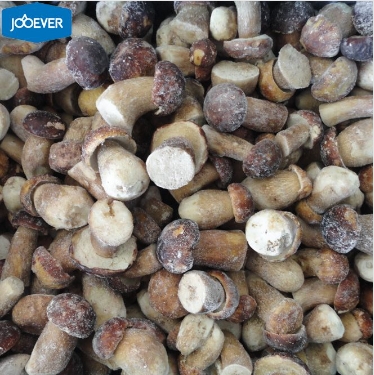Your reliable partner for frozen foods
Mushrooms, with their earthy flavors and versatile use in culinary arts, have
long been a staple in kitchens around the world. However, one of the significant
challenges mushroom lovers face is their relatively short shelf life. Fresh
mushrooms tend to become slimy and unappealing after just a few days in the
refrigerator, leading to wastage and disappointment. Fortunately, freezing
offers a practical solution to extend the life of these beloved fungi, ensuring
that they remain available and fresh for cooking needs. This guide dives deep
into the art of freezing mushrooms, ensuring you can enjoy their delightful
taste and nutritional benefits all year round.
Before you can freeze mushrooms, a bit of preparation is necessary to maintain their quality. Start by cleaning the mushrooms gently with a soft brush or a damp cloth to remove any dirt. It's crucial not to soak mushrooms in water as they absorb moisture, which can lead to a soggy texture upon thawing.
Slicing the mushrooms is the next step. While you can freeze mushrooms whole, slicing them can save space and make them more convenient to use directly from the freezer. Consider the dishes you'll use the mushrooms for and slice accordingly—thinly for quick sautés or thicker for stews and soups.
The decision to blanch mushrooms before freezing is a matter of personal preference and intended use. Blanching—briefly boiling mushrooms and then plunging them into ice water—can help preserve their color, texture, and nutritional value. However, for those who prioritize flavor and plan to use mushrooms primarily in cooked dishes, blanching might be an optional step.
There are several effective methods to freeze mushrooms, each with its benefits.
Flash-Freezing: This technique involves spreading sliced or whole mushrooms on a baking sheet and freezing them individually before transferring them to a freezer-safe bag or container. Flash-freezing prevents the mushrooms from sticking together, allowing you to use the exact amount needed without thawing the entire batch.
Sautéing Before Freezing: Pre-cooking mushrooms in a bit of oil or butter not only enhances their flavor but also makes them more versatile for future use. Allow the sautéed mushrooms to cool completely before freezing them flat on a baking sheet, then transfer them to a freezer bag. This method is excellent for adding depth to soups, sauces, and stir-fries.
Blanching Before Freezing: For those who prefer blanching, the key is to boil mushrooms for just a minute or two, depending on their size, then cool them rapidly in ice water. Drain the mushrooms well and spread them on a baking sheet to freeze individually. Once frozen, pack them in freezer bags, removing as much air as possible to prevent freezer burn.
Proper packaging is crucial for preserving the quality and extending the shelf life of frozen mushrooms. After pre-freezing mushrooms on a tray, transfer them to airtight freezer bags or containers. Squeeze out as much air as possible from freezer bags to prevent freezer burn, which can affect the texture and flavor of the mushrooms. Label each package with the date of freezing; this will help you use the mushrooms while they are still at their best quality. Frozen mushrooms can last up to 12 months in the freezer, but for optimal taste, consider using them within six months.
Organizing your freezer space can also enhance the longevity of your frozen mushrooms. Store them in a part of the freezer where the temperature remains constant, away from the door. This prevents temperature fluctuations that can lead to ice crystals forming on the mushrooms, which may degrade their quality over time.

Thawing frozen mushrooms correctly is essential for maintaining their texture and flavor. For most cooking applications, you can use mushrooms directly from the freezer without thawing, especially if they're going into soups, stews, or sautés. If you need to thaw them, place the mushrooms in the refrigerator overnight, allowing them to thaw gradually. Avoid thawing mushrooms at room temperature or using a microwave, as these methods can cause them to become mushy.
Frozen mushrooms are incredibly versatile and can be used in a wide range of dishes. They're excellent in pasta sauces, risottos, omelets, and casseroles, adding depth and umami to your meals. Remember that frozen mushrooms may release more water than fresh ones during cooking, so you may need to adjust cooking times and methods accordingly.
Will freezing affect the texture of mushrooms? Freezing can change the texture of mushrooms, making them slightly softer than fresh ones. However, this is hardly noticeable in cooked dishes where mushrooms are typically softened during the cooking process.
Can all types of mushrooms be frozen? Most mushrooms freeze well, including popular varieties like button, cremini, and portobello. More delicate varieties, such as chanterelles and morels, can also be frozen but are best used in cooked dishes to minimize texture changes.
Do I need to cook frozen mushrooms before using them? It's not necessary to cook mushrooms before freezing, but pre-cooking them can enhance their flavor and texture when used later. Whether or not to cook frozen mushrooms before use depends on personal preference and the specific recipe.
Freezing mushrooms is a fantastic way to preserve their freshness and extend their shelf life, ensuring you have a steady supply of this versatile ingredient all year round. By following the guidelines outlined in this guide—from selecting and preparing mushrooms to freezing, storing, and using them—you can maximize the quality and flavor of your mushrooms. Whether you're a seasoned chef or a home cook, mastering the art of freezing mushrooms will elevate your culinary creations and reduce food waste. Embrace the freeze and enjoy the bounty of mushrooms in your cooking any time you wish.